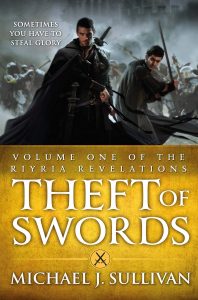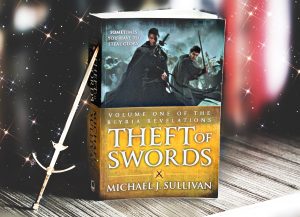THEFT OF SWORDS by Michael J. Sullivan (BOOK REVIEW)
“Hadrian went down into the cellar, leaving Royce staring out at the night sky and the gathering clouds that crossed the stars. The wind was still up, whipping the trees and battering the fires. He could almost smell it: change was in the air and it was blowing their way.”
Theft of Swords by Michael J Sullivan has been a long-standing book on my shelf; seriously, it’s been there for years. Well in December (2022) I was in the mood for something cosy, fun and nostalgic to immerse myself into over the Christmas period, and so a friend said I needed to finally pick up Sullivan’s Riyria Revelations series… and they were absolutely spot on. Theft of Swords at its heart is old school high fantasy, it’s a story filled with adventure, peril, banter and monsters. It was the exact kind of read I had been craving.
 Though these books had originally been self-published separately, my edition published by Orbit Books contains two stories in one volume: The Crown Conspiracy and Avemparth. Despite both stories having different narrative arcs, Sullivan cleverly connects them together to build upon a more expansive story, and at its centre is Hadrian Blackwater and Royce Melborn, known as The Riyria. One a highly skilled thief and the other a mercenary, together Hadrian and Royce make a living taking on dangerous and clandestine jobs for nobles. As long as money comes their way, there’s no job the pair won’t accept. Except when they take on the task of stealing a fabled sword from a highly guarded castle, they find themselves framed for the murder of the King of Melengar. Thus begins an adventure of keeping the next king alive, freeing an ancient wizard, rescuing a princess accused of witchcraft and then in Avemparth saving an entire village from a deadly winged beast and once again finding a magical sword believed to be the only weapon able to slay it.
Though these books had originally been self-published separately, my edition published by Orbit Books contains two stories in one volume: The Crown Conspiracy and Avemparth. Despite both stories having different narrative arcs, Sullivan cleverly connects them together to build upon a more expansive story, and at its centre is Hadrian Blackwater and Royce Melborn, known as The Riyria. One a highly skilled thief and the other a mercenary, together Hadrian and Royce make a living taking on dangerous and clandestine jobs for nobles. As long as money comes their way, there’s no job the pair won’t accept. Except when they take on the task of stealing a fabled sword from a highly guarded castle, they find themselves framed for the murder of the King of Melengar. Thus begins an adventure of keeping the next king alive, freeing an ancient wizard, rescuing a princess accused of witchcraft and then in Avemparth saving an entire village from a deadly winged beast and once again finding a magical sword believed to be the only weapon able to slay it.
In the backdrop the world of Elan is in strife, humans oppress elves and live in conflict, dwarves roam freely, forging weapons and machinery, and the Nyphron Church are hell-bent on tightening their control. For a prophecy foretells the Heir of Navron will emerge and once again rule over the entire land, but will he destroy humanity or save them?
“Noble or commoner, people all lie, cheat, and pay me to do their dirty work. Regardless of who rules, the sun still shines, the seasons still change, and people still conspire. If you must place labels on attitudes, I prefer to think of myself as an individualist.”
One of the immediate aspects I noticed was that Sullivan’s characters are extremely charming. Hadrian may be a renowned warrior, but he also has a strong moral code, which often internally conflicts with the jobs he takes on. Whereas Royce has no such qualms, he’s a character who never shies away from being murderous. Yet together they seem to balance each other out, Hadrian is always there to reign in Royce when his temper flares and to be his moral compass, and Royce is always there to protect Hadrian. I’ve always found myself partial to a good brotherly duo (even when they’re not actual brothers), for example, Wax and Wayne from Mistborn era two, and Locke and Jean from The Lies of Locke Lamora. Hadrian and Royce are up there with my favourites, the banter between them, the friendship and the loyalty they have for one another never fails to make me smile. It isn’t long before you feel like you truly know these two characters and they become like longtime friends who’s shenanigans you love to watch play out. Don’t you just love it when an author can do that?
Aside from Hadrian and Royce Sullivan also creates compelling side characters. Prince Alric and Princess Arista are among my favourites. At first glance, Prince Alric appears naive and self-centred, but as his character becomes more significant following the death of his father, King Amrath, we watch him mature and take his responsibilities seriously. By the end of the first book, I thoroughly admired his growth. As for Princess Arista, she’s exactly the kind of female character I always enjoy. Yes, she is isolated and a self proclaimed recluse, but she holds a great depth of intelligence and an instinct for problem-solving. She may not always get things right (who ever does?) but she does contemplate every action she makes and strives to take charge of her own life despite the world’s patriarchal restraints.
“The thought of a woman with magical powers is terrifying to old men in comfortable positions. Even without the fear of witchery, most nobles are uncomfortable with the thought of a woman monarch.”
I’ve seen criticism for Sullivan’s female characters being portrayed as “damsels in distress”, and whilst yes characters such as Thrace in Avemparth needs the help of Royce and Hadrian to save her father and village, I would disagree that this is a weakness on her part. When did it become a weakness to ask for help? Thrace is a simple farmer’s daughter, having never left her village before her first act of courage comes when she goes in search of The Riyria, when her love and the pain of her losses drive her to do what the other villagers could not and seek skilled warriors to kill the beast terrorising them. Strength does not only come from wielding a sword and charging into battle, sometimes admitting you need help is the biggest act of bravery. Besides my beloved Mauvin and Fanen Pickering, who I have to give an honourable mention to here, show us that being skilled with a sword can be fun and useful but in reality it can also make you foolhardy.
“You don’t win battles with hate. Anger and hate can make you brave, make you strong, but they also make you stupid.”
Sullivan’s prosaic style feels incredibly nostalgic, reminding me of the high fantasies I have always found comfort in. This is not a criticism of modern fantasy by any means as I truly love how the genre has evolved and the variety we are now able to experience is incredible, but trends have moved away from worlds featuring elves and dwarves, chosen ones and prophecies, fun adventurous quests. I personally miss that, therefore it is nice when I do come across an author who uses traditional fantasy tropes. One of which being an ancient wizard. Sullivan incorporates low-key magic, with the infamous wizard Esrahaddon and Princess Arista being the main two characters with magical abilities. In Elan magic has become arcane and subsequently outlawed by the Nyphron Church; anyone suspected of wielding it is executed. Throughout, Sullivan enriches his worldbuilding with much history, including that of the Emperor and his elite wizards and knights, and their war with the elves. We slowly uncover more layers giving us a thorough view of how the world has changed and foreshadowing the dangers to come.
Theft of Swords really embodies the high fantasy genre, it includes organically likable characters and a world so wonderfully layered there is always more to uncover. I have heard the next two books in the series, Rise of Empire and The Heir of Navron are even better, I truly hope this is so because after loving this first instalment my excitement for the sequels is immense.


[…] review will contain spoilers for the previous books in this series, Theft of Swords and Rise of Empire. There may also be minor spoilers for Heir of Novron as I discuss the […]
I love this entire series, so I do hope that you’ll continue reading them! They’re popcorn fantasy, light and fun without being grim. Hadrian will forever be my favorite, though!
Hi Jordyn, I’m onto book two already and loving it! The characters have really grown. So far my favourite is Royce but I do love Hadrian too.